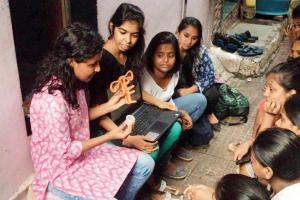Experts say used pads, disposed with house waste, are hazardous to sanitation workers; want MoEF to add manufacturers role to its EPR framework

Volunteers from Muse Foundation conducting a session on sustainable menstruation in a slum
Akshay Kumar won thousands of hearts when portraying Laxmikant in Pad Man (2018), a man who creates a machine that can churn out affordable, disposable sanitary napkins. Kumar's flick is not an isolated incident; rather, it is part of a larger trend. Menstrual hygiene products have experienced a boom in India, with the demand for pads being particularly high.
According to the National Health Family survey (2015-16), 78 per cent of menstruators in urban areas and 48 per cent of menstruators in rural areas use pads.
ADVERTISEMENT

Ashish Jain and Lalita T
There are approximately 33.6 crore menstruators in India, according to an estimate by the Menstrual Hygiene Alliance of India (MHAI). Research shows that the market is expected to grow further. One might be tempted to interpret this as a success story; after all, India is a country where periods are generally considered to be a polluting occurrence, and pads not only provide menstruators with a sense of dignity, but act to enhance their mobility.
However, according to Nishant Bangera, we need to look at the whole picture. "Absorbent hygiene products such as diapers, pads and tampons are non-biodegradable because they contain plastic. Not only are they harmful to the environment, they also adversely impact the health of sanitation workers and waste pickers who come in contact with them," said the head of Muse Foundation, a Thane-based NGO. Pads consist of 90 per cent plastic and can take 500-800 years to decompose if thrown into the open.

Nishant Bangera
Bangera has been working in the field of sustainable menstrual health for the past five years, as part of his NGO's initiative, A Period of Sharing, where they endorse eco-friendly alternatives like cloth pads and menstrual cups. He believes that menstrual products should be included in the Ministry of Environment and Forests' (MoEF) Uniform Framework of Extended Producers Responsibility (EPR). Since the MoEF invited suggestions from stakeholders till July 31, the Muse Foundation mailed them a presentation asking for absorbent hygiene products to be brought under the ambit of EPR. EPR refers to an approach to solid waste management where the producer's responsibility includes all of the environmental costs associated with a product throughout its lifecycle. "We have rules in place for the disposal of solid waste, plastic waste, e-waste and biomedical waste. But currently, there is no mechanism to deal with sanitary waste, which contains bodily fluids and pathogens, generated as a part of household waste. Hence, there is a tremendous need to address its collection and treatment because of its hazardous potential," said Ashish Jain, the founder director of Indian Pollution Control Association and a member of the core committee of the Central Pollution Control Board.
So, what happens to menstrual waste generated at home? "Most of us don't segregate waste at home. Menstrual waste is dumped in the bin along with the rest of the waste. They end up at landfills, and when they aren't incinerated scientifically, they emit toxic gases," explained Lalita T. She works as a consultant for the Stree Mukti Sanghatana, an organisation working for the rights of women waste pickers.
"Producers need to actively come up with solutions to deal with menstrual waste. They are lax and there is little care about the people from marginalised caste, class backgrounds, who handle the waste," she added.
The National Green Tribunal (NGT) had issued notices to the Maharashtra government and private companies, saying that manufacturers of pads and diapers are violating the Solid Waste Management Rules (2016) by not providing pouches for disposing them. Nothing came of it. Since a handful of companies have monopolised the Indian menstrual products market, they need to work in tandem with urban local and municipal bodies to menstrual waste.
78
Percentage of menstruators in urban areas who use pads as per the 2015-16 National Health Family survey
Catch up on all the latest Mumbai news, crime news, current affairs, and a complete guide from food to things to do and events across Mumbai. Also download the new mid-day Android and iOS apps to get latest updates.
Mid-Day is now on Telegram. Click here to join our channel (@middayinfomedialtd) and stay updated with the latest news
 Subscribe today by clicking the link and stay updated with the latest news!" Click here!
Subscribe today by clicking the link and stay updated with the latest news!" Click here!







